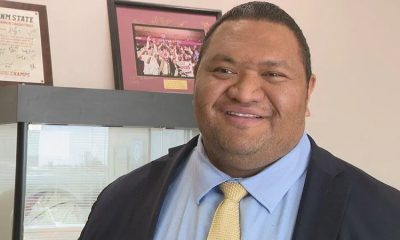U. S. News
Trump and 17 states back Texas bid to undo his election loss at Supreme Court

WASHINGTON — President Donald Trump on Wednesday asked the U.S. Supreme Court to let him join a long-shot lawsuit by Texas seeking to overturn his election loss by throwing out the voting results in four states, litigation that also drew support from 17 other states, including from Utah Attorney General Sean Reyes.
In a court filing, Trump asked to intervene in the Texas lawsuit, the latest litigation to try to undo Democratic President-elect Joe Biden’s victory over the Republican incumbent in the Nov. 3 election. In a separate brief, lawyers for 17 states led by Missouri’s Republican Attorney General Eric Schmitt also urged the nine justices to hear the case.
Efforts in the courts on behalf of Trump challenging the election results so far have failed.
The lawsuit, announced on Tuesday by the Republican attorney general of Texas Ken Paxton, targeted four states that Trump lost to Biden after winning them in the 2016 election. Trump has falsely claimed he won re-election and has made baseless allegations of widespread voting fraud. Election officials at the state level have said they have found no evidence of such fraud.
Writing on Twitter earlier on Wednesday, Trump said, “We will be INTERVENING in the Texas (plus many other states) case. This is the big one. Our Country needs a victory!”
Election law experts have said the Texas lawsuit stands little chance of success and lacks legal merit.
“Both procedurally and substantively, it’s a mess,” Justin Levitt, an election law professor at Loyola Law School in California, said of the Texas lawsuit. “There’s zero chance the court agrees to take the case.”
In addition to Missouri, the states joining Texas were: Alabama, Arkansas, Florida, Indiana, Kansas, Louisiana, Mississippi, Montana, Nebraska, North Dakota, Oklahoma, South Carolina, South Dakota, Tennessee, Utah and West Virginia. All of the states were represented by Republican officials in the filing. All but three of the states have Republican governors.
Officials from Georgia, Michigan, Pennsylvania and Wisconsin have called the lawsuit a reckless attack on democracy. It was filed directly with the Supreme Court rather than with a lower court, as is permitted for certain litigation between states.
The Texas suit argued that changes made by the four states to voting procedures amid the coronavirus pandemic to expand mail-in voting were unlawful. Texas asked the Supreme Court to immediately block the four states from using the voting results to appoint presidential electors to the Electoral College.
Biden has amassed 306 electoral votes — far higher than the necessary 270 — compared to Trump’s 232 in the state-by-state Electoral College that determines the election’s outcome. The four states contribute a combined 62 electoral votes to Biden’s total.
Texas also asked the Supreme Court to delay the Dec. 14 date for Electoral College votes to be formally cast, a date set by law in 1887.
Democrats and other critics have accused Trump of aiming to reduce public confidence in U.S. election integrity and undermine democracy by trying to subvert the will of the voters.
-

 Local News1 week ago
Local News1 week agoTwo more names are added to the Utah NHL team’s trademark list
-

 Local News1 week ago
Local News1 week agoThe Draper rock snake outgrows its house and makes its way to Utah Arts Alliance
-

 Local News2 weeks ago
Local News2 weeks agoA large number of people start running in the Salt Lake City Marathon
-

 Local News2 weeks ago
Local News2 weeks agoProcedure for securely bringing prisoners from Utah to court
-

 Local News2 weeks ago
Local News2 weeks agoAll downtown companies should benefit from the rising wave of the Utah NHL
-

 Local News1 week ago
Local News1 week agoAs the new city manager of West Valley City, a former NFL player takes the helm
-

 Local News2 weeks ago
Local News2 weeks agoUtah may amend its regulations on foreign students participating in high school sports
-

 Local News1 week ago
Local News1 week agoUtah organizations create pro-Palestine memorial downtown






Leave a Reply